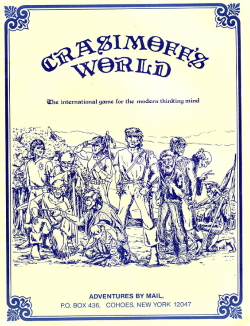Related Research Articles

A play-by-mail game is a game played through postal mail, email, or other digital media. Correspondence chess and Go were among the first PBM games. Diplomacy has been played by mail since 1963, introducing a multi-player aspect to PBM games. Flying Buffalo Inc. pioneered the first commercially available PBM game in 1970. A small number of PBM companies followed in the 1970s, with an explosion of hundreds of startup PBM companies in the 1980s at the peak of PBM gaming popularity, many of them small hobby companies—more than 90 percent of which eventually folded. A number of independent PBM magazines also started in the 1980s, including The Nuts & Bolts of PBM, Gaming Universal, Paper Mayhem and Flagship. These magazines eventually went out of print, replaced in the 21st century by the online PBM journal Suspense and Decision.
Starweb is a closed-end, space-based, play-by-mail (PBM) game. First published by Flying Buffalo Inc. in 1975, it was the company's second PBM game after Nuclear Destruction, the game that started the PBM industry in 1970. Players today can choose a postal mail or email format. Fifteen players per game assume one of six available roles and explore and conquer planets within a universe comprising 225 worlds. The object of the game is to attain a predetermined number of points which are generated by various actions during gameplay. Multiple game variants are available. Starweb is still available for play as of 2021 through the company Rick Loomis PBM Games.
The Tribes of Crane is a play-by-mail game that was published by Schubel & Son. The game was launched in 1978.
Universe II is a computer-moderated, science fiction, play-by-mail game designed by Jon Clemens and published by Clemens and Associates, Inc. in 1979.

Empyrean Challenge is a strategic science fiction play-by-mail (PBM) game. Published by Superior Simulations in 1978, its introduction was important to the nascent PBM industry. 150 players per game strove to dominate a cluster of star systems. Diplomacy, combat, economics, technological development, colonization, and other factors were important aspects of gameplay. Detailed work was required in all aspects of the game, requiring a significant investment in time for players. Reviewer Jim Townsend stated in 1988 that Empyrean Challenge was "the most complex game system on Earth".
Pellic Quest was a computer-moderated science fiction play-by-mail (PBM) game appearing as early as 1978. Conflict Interaction Associates published it as a spinoff of Flying Buffalo's game Starweb. In the game, 10–15 players competed to dominate a universe strewn with artifacts left by a super-race, the Pellics. Players role-played one of six character types with options to develop their position, expand through conquest, conduct diplomacy, and other actions. The game received generally positive reviews in gaming magazines in the late 1970s and early 1980s. The publisher appeared to close the game by 1988.
Starlord is an open-ended, computer moderated, space-based play-by-mail game. Designed and moderated by Mike Singleton, gameplay began initially in the United Kingdom, with Flying Buffalo launching a version in the United States in 1983. Gameplay was limited to 50 players roleplaying as Starlords with the goal of becoming emperor by conquering the Throne Star. Starlord was reviewed multiple times in magazines such as Dragon and The Space Gamer in the early 1980s, receiving generally positive reviews, with one reviewer noting the possibility of the game lasting for years.

Heroic Fantasy is a computer-moderated, dungeon crawl play-by-mail game. It has been active since 1982 when it was published by Flying Buffalo. The initial edition involved nine dungeon levels. Flying Buffalo published subsequent editions due to challenging gameplay initially, eventually limiting the game to four dungeon levels with a fifth outdoors level where players can assemble an army and capture one or more castles. The game is open-ended; gameplay continues until players decide to stop.

Galactic Conflict is a space-based, computer-moderated, play-by-mail game originally published by Flying Buffalo in 1982. As August 2021, Rick Loomis PBM Games took over as game publisher. During gameplay, six to fifteen players expand across the galaxy, building industrial capacity and pursuing Civilian Projects through various means. Some player diplomacy is typical. The game received multiple reviews in the early 1980s, receiving generally positive comments.
Star Venture is a play-by-mail game begun by Schubel & Son in 1982. The game was open-ended and computer moderated.
Realms of Sword and Thunder is a play-by-mail game that was published by Empire Games, Inc.
Quest of the Great Jewels is a closed-end, computer moderated, play-by-email game. It was initially published and moderated by Zorph Enterprises in the early 1980s. The game was created by Mike Shefler.
Midgard is an open-end, medieval fantasy play-by-mail game. It was published in 1984 by Time Space Simulations. Through 1996, the game passed through more than four different publishers, including Midgard USA. As of 2022, Talisman Games is the publisher. At initial publication, Midgard was computer moderated with partial human moderation.

Crasimoff's World is a play-by-mail (PBM) game that was first developed by Kevin Cropper in 1980. It is regarded as the first fantasy role-playing PBM game.

Warboid World is a play-by-mail game originally published and moderated by Adventures by Mail in 1983 in which players build up armies of robots and send them to destroy other players' robot factories.
Lords of the Earth (LOTE) is a play-by-email game, first published by Thomas Harlan in 1983 during a growing era of PBM games. Initially played by postal mail, the game featured mixed moderation—computer moderated with some human assistance. By 2002, the publisher processed turns by email (PBeM). Lords of the Earth comprises multiple campaigns, each one a separate game. Campaign 1 is the oldest, set in the mid-1800s in the "Age of Air and Steam". Other campaigns begin from 2000 BCE to 1400 CE. Settings were global in scale, with one campaign featuring an outer space setting.
Schubel & Son was a hobby and gaming company that published play-by-mail (PBM) games. The company began in 1974 and expanded to large-scale PBM games in August 1978. It also published the game The Tribes of Crane in 1978, followed by StarMaster in 1980 and Global Supremacy in 1982.

Quest is an open-end, fantasy, play-by-mail (PBM) role-playing game. Initially released in the United Kingdom in 1991, by Adventures by Mail, it later became available for play in the United States, Australia, and other countries in Europe. The game has a First and Second Age, initially comprising about twenty worlds of up to 1,000 parties controlled by players. After the year 2000, the worlds consolidated into four. The current publisher is KJC Games.
Galaxy: Alpha is a science fiction play-by-mail PBM game available for play by 1984. Bruce Lockhart of Intergalactic Games co-designed the game as an improvement on the PBM game Starmaster by Schubel & Son. A human-moderated, open-ended game of medium to high complexity, the game had a massive gameplay setting. Players focused on expansion by conquest with combat as a central feature. The game received various reviews in gaming magazines of the 1980s, receiving low marks for its poorly written rulebook with high marks for gamemaster support and generally for the game overall.
References
- 1 2 3 4 Lloyd, Richard (July–August 1992). "Gameline: StarMaster will not be continuing". Paper Mayhem . No. 55. p. 35.
- 1 2 Jones, Stefan (May–June 1980). "Capsule Reviews". The Space Gamer . No. 28. Steve Jackson Games. p. 26.
- 1 2 3 4 5 6 Fawcett, Bill (October 1980). "The Dragon's Augury". Dragon . No. 42. TSR, Inc. p. 52.
- ↑ Gray, Michael (April 1983). "The PBM scene: Facts you can use when YOU choose what game to play". Dragon . No. 72. TSR, Inc. p. 32.
- ↑ Creese, Brian (May 1984). "Chain Mail". Imagine (review). No. 14. TSR Hobbies (UK), Ltd. p. 39.